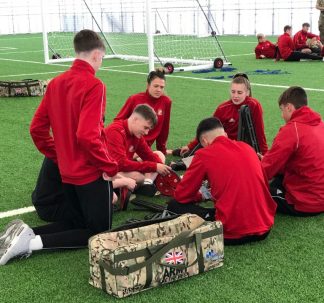Cadet training is back!
The Top 10 MTa Activities for the New Normal.
Seeing Cadet Squadrons get back to face-to-face MTa training has put a smile on our faces here at HQ. Through minor adaptions to briefs, training can continue to (safely) embrace the hands-on approach that we are all so passionate about.
This approach is key to our experiential learning philosophy and with small changes you can still run fun and thought-provoking activities with your Cadets, excite them about STEM careers; and develop team and interpersonal skills, just the way you did before.
Over the past few months we’ve been asked lots of questions about how our kits can be used in ‘new normal’ so we put together a list of the activities that will work best, so you can get the very best out of our MTa Kits and your Cadet training sessions.
For some activities making simple adaptions needn’t compromise the outcome of a session, such as spacing chairs, limiting team/bubble size and for facemasks to be worn, for example.
Here is a list of those activities we think will provide your squadron with the best results.
MTa activities that can be completed while physically distanced:
| Theme | Activity | Kit | Learning Outcomes |
| 1) Accuracy in Communication | Getting it Right | MTa Insights | Accuracy in communication: the cost of errors, the importance of clear and unambiguous instructions, verbal vs. pictoral vs. written instructions. |
| 2) Accurate and Efficient Verbal Communication | Blind Statues | MTa Insights | Group members have to create simple structures that will enable them to move an object as far as possible. The task involves a planning and an implementation phase. |
| 3) Leadership Communication | Led Statues | MTa Insights | The leader(s) have to work through their teams to complete the task which needs careful work. There are different constraints on leaders and team members which demand excellent verbal communication between the leader and the whole team as well as individuals. |
| 4) Leadership for First Time Leaders | Roulette Wheel | MTa Team KIT | In the task callers (leaders) have very different roles from other team members. However the whole team has to plan how they are to complete the task and solve problems together along the way. |
Physically distanced activities with shared components:
In these MTa activities participants can remain physically distanced but share components.
| Theme | Activity | Kit | Description |
| 5) Innovation and Change | Domino Theory | MTa Team KIT | The task is quick, simple and fun, with each team’s performance clear for all to see. Teams are given a chance to improve their performance. The challenge is to kerb enthusiasm for more action and to challenge basic assumptions, consider alternatives and decide how to improve. |
| 6) Team versus Individual Success | Digital Display | MTa Team KIT | Everyone has a task, so looking after yourself first is tempting, and personal achievement satisfying, but what if your short-term success prevents others (and therefore the team) from completing the overall task? |
| 7) Problem Solving and Effective Communication | Minefield | MTa STEM | Teams race against each other to complete a simple task. There are several ways to accomplish it, but mistakes are penalised severely. Time spent planning and the careful execution of these plans is essential. |
| 8) Problem Solving and Effective Communication | Back to Back | MTa STEM | This task involves effective communication at two levels, within and between pairs. |
| 9) Team Development | Park Life | MTa STEM | Two teams working in separate locations are interdependent. Both have to complete the task which, through effective written instructions, will enable the other to complete a second task |
| 10) Inter-team Working | Helipads | MTa MINI | Teams work to build the best helipads they can – but to be effective they’ll need to coordinate their efforts with other teams. |
We hope this helps towards your programme planning but if you’d like more help deciding which would be the best activity for your session, or learn more about how to adapt a specific activity then please do not hesitate to call or email us.
Likewise, if you can share your experiences on ways you have adapted training to meet new guidelines or if you go ahead and experiment with our ideas, any feedback would be very welcome and beneficial.
Adapting to change is no doubt going to be a continual process and one which will simply become second nature – a time of learning and development for all concerned. And it is at times like these that working together is essential.
Together we can create positive experiences and memories for our young people in these strange and uncertain times.

